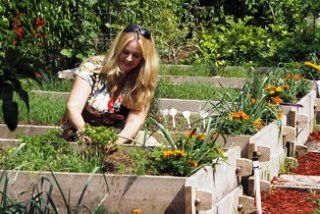|
Article Courtesy of The Miami Herald By Laura Figueroa Published March 10, 2011
While South Florida’s sun and soil may be ideal for
growing fruit trees and vegetable gardens, code enforcement says one homeowner
must get rid of her garden.
When First Lady Michelle Obama instructed White House staff to plant an organic vegetable garden for the First Family, Weston’s Amy Becerra was hopeful the trend would catch on. Her own collection of fruits and vegetables includes peas, carrots, corn, tomatoes, strawberries and oranges, all grown without pesticides or growth chemicals. But the homeowners association where she lives has ordered Becerra to remove her fruit trees and the raised beds of vegetables and herbs growing in her backyard – or face paying $100 a day in fines. “If the President is growing a vegetable garden at the White House,” Becerra said. “I don’t see what’s the problem with having one in my own backyard.”
also provides certain guidelines as to the rights homeowners have in deed restricted communities.
“A deed restriction or covenant may not prohibit or be enforced so as to prohibit any property owner from implementing Florida-Friendly landscaping on his or her land,” Becerra said reading from a print out of the law. However, the program’s statewide director Dr. Esen Momol, said while the program’s staff can “offer technical assistance and education,” it “cannot advise any party of legal rights and cannot resolve disputes between HOAs and homeowners.” Wednesday, Becerra will present her case to the Weston Hills/North Hills Homeowners Association. If the board sides against her, she faces paying $100 for each day she does not remove the plants. The association did not return calls from the newspaper on Monday or Tuesday. In preparing for her case, Becerra recently drove throughout her Weston Hills subdivision trying to tally the fruit trees she spotted growing throughout the community. Her final count came out to 103 homes, growing everything from avocados to lemons. She said she brought it to the attention of the HOA managers, not to rat out other residents but to highlight how the trees are fixtures through out the community. Becerra said was told by the management company that they could not comment on other households . “Across the country there are so many laws and programs encouraging people to grow their own foods,” Becerra said as she examined a vine of tomatoes growing in her back yard. “I don’t understand why I should be discouraged from planting fruits and vegetables for my family to enjoy. ” Former North Miami Beach Mayor and Commissioner Frank Wolland, an attorney by profession, volunteered to represent Becerra. Her case struck a chord with Wolland, who as a commissioner found himself the target of complaints for planting a vegetable garden in his front yard. Eventually he was made to remove the vegetable garden, which he replaced with rose bushes. “The architectural control guidelines want all the houses to look the same,” Wolland said of the HOA guidelines. “Well, from the street you can’t tell that this house is any different from any of the other neighboring houses,” Wolland said. “It looks just as nice. You can’t tell there is a vegetable garden until you start climbing around to see what’s going on back there. That’s the point at which Big Brother has to stand back.” Having sat on both sides of the dais – as a lawyer representing residents and as a commissioner sitting on the code enforcement board – Wolland said even residents without the means to hire an attorney should come prepared with as much information as they can get their hands on to make their case. “You don’t have to be an attorney to stand up for your rights,” Wolland said. “Sometimes the people who sit at City Hall or on these boards want to do the right things, sometimes they need to be educated, they may not be an expert in all these things.” Battles between residents and strict code enforcement and HOA guidelines are not uncommon in South Florida, where everything from house colors to grass length are regulated. “I represented a woman in Miami Shores whose husband died of cancer and she was trying to sell the house but she couldn’t because there was a $6,000 fine levied against her house,” Wolland recalled. “We tried to get the fine reduced. The woman explained that her husband was the one who usually took care of mowing the lawn, but between his cancer and taking care of him it was something they let slip, and basically their response was ‘gee sorry, but we’re not going to reduce the fine.’ “Frankly code enforcement should be a means of ensuring compliance, not a means of punishing people.” |
